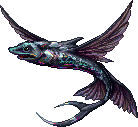Viewing eXuxb

Father: Unknown
Unknown Pedigree
Hardiness: 4
Appearance: 10
Emerged: 17:03 18.08.2024
Matured: 3:19 20.08.2024
Schools of Glita Skvamos tend to be small, rarely numbering more than a dozen, and are most commonly found in tropical or subtropical waters. Preliminary observations in the laboratory have shown they are capable of surviving in colder waters but are less active above the surface in such conditions. Glita Skvamos can glide through the air for brief lengths of time—they propel themselves from the water using their long tails and then extend winglike fins to catch the wind. When underwater, they keep their fins folded tight against their streamlined bodies. Their highly iridescent scales reflect light in a dazzling display that serves to confuse both prey and would-be predators. Though Glita Skvamos mainly consume medium-sized fish such as Limaka Cevalos, there have been reports of them catching seabirds that ventured too close to the surface. They have a large appetite due to the energy required for jumping and gliding, with females consuming more than males due to their slightly larger size. Glita Skvamos spawn in the open ocean, usually in a seaweed patch where the clumps of eggs are provided some protection until they hatch.
The creatures that dwell in this rather desolate world still display some diversity in appearance, eating habits, and social behavior. Whether they have fur or feathers, skin or scales, their unique genetic makeup allows for a variety of colors and markings within each species. Despite limitations in food sources, herbivores, omnivores, and carnivores are all present in the food chain, and each species requires specialized care within a laboratory. Although the artificial setting of housing units and breeding pods precludes most opportunities to study true interspecific behavior, the interactions within and between species has been studied extensively in the wilderness by scientists daring enough to venture beyond the outpost’s walls.
